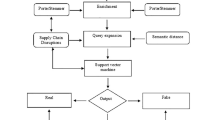Abstract
The lottery is a very lucrative industry. Popular fascination often focuses on the largest prizes. However, less attention has been paid to detecting unusual lottery buying behaviors at lower stakes. Our paper introduces a new model to detect illegal discounting in the North Carolina Education Lottery using statistical analysis of net gains and ticket buying habits. Nine outlying players are flagged and are further examined using a proposed stochastic model to calculate the range of their possible losses in the lottery. The unusual buying patterns of the players flagged as outliers are further confirmed using a K-means clustering analysis of lottery store visiting behaviors.







Similar content being viewed by others
Data Availability
See Appendix A
Code Availability
See Appendix A
References
Arratia, R., Garibaldi, S., Mower, L., Stark, P.B.: Some people have all the luck. Mathematics Magazine 88(3), 196–211 (2015). https://doi.org/10.4169/math.mag.88.3.196
Dotson, K.: A father and son will go to prison for a $20 million lottery scheme. CNN (2023). Published on May 24, 2023. Last accessed on June 2, 2023
Guryan, J., Kearney, M.S.: Lucky stores, gambling, and addiction: Empirical evidence from state lottery sales. National Bureau of Economic Research Cambridge, Mass., USA (2005)
Off, G., Bell, A.: How NC lottery ticket swappers avoid taxes, scrutiny. Charlotte Observer (2016). Published on September 29, 2016. Last accessed on May 26, 2023
Stong, R., Garibaldi, S.: Optimal play for multiple lottery wins. The Electronic Journal of Combinatorics (P3.56) (2020). https://doi.org/10.37236/9555
Funding
Jan Hannig’s research was supported in part by the National Science Foundation under Grant No. DMS-1916115, 2113404, and 2210337.
Author information
Authors and Affiliations
Corresponding author
Ethics declarations
Competing Interests
Not applicable
Ethics Approval
Not applicable
Consent to Participate
Not applicable
Consent for Publication
Not applicable
Additional information
Publisher's Note
Springer Nature remains neutral with regard to jurisdictional claims in published maps and institutional affiliations.
Supplementary Information
Below is the link to the electronic supplementary material.
Rights and permissions
Springer Nature or its licensor (e.g. a society or other partner) holds exclusive rights to this article under a publishing agreement with the author(s) or other rightsholder(s); author self-archiving of the accepted manuscript version of this article is solely governed by the terms of such publishing agreement and applicable law.
About this article
Cite this article
Fu, J., Prothero, J. & Hannig, J. Algorithm for Detection of Illegal Discounting in North Carolina Education Lottery. Sankhya B 86, 224–240 (2024). https://doi.org/10.1007/s13571-024-00323-1
Received:
Accepted:
Published:
Issue Date:
DOI: https://doi.org/10.1007/s13571-024-00323-1




